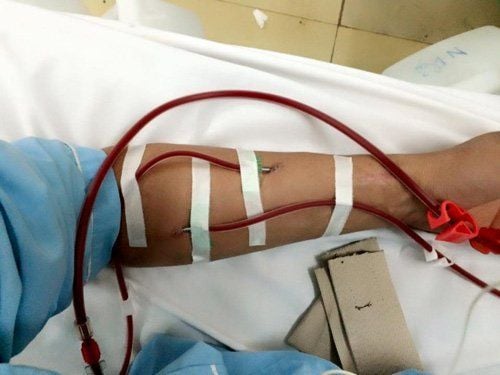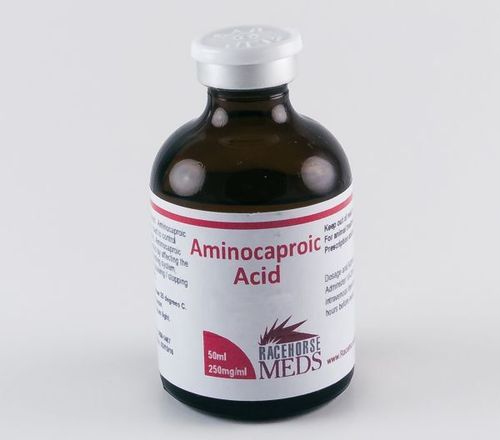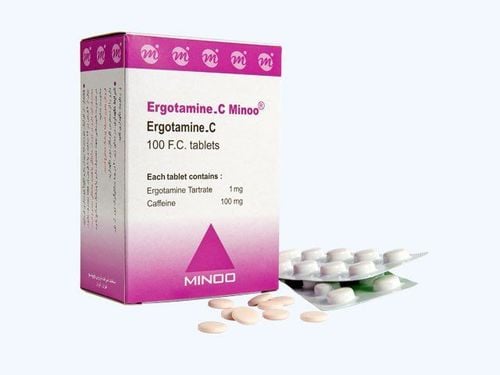This is an automatically translated article.
The article was written by Dr. Nguyen Ngoc Phuong Nam - Emergency Medicine Doctor, Emergency Department - Vinmec Central Park International General HospitalMassive blood transfusion in emergency to save life of critically ill patients due to causes of heavy bleeding such as: Multiple trauma, ruptured aortic aneurysm, postpartum haemorrhage..., but massive blood transfusion It also brings a lot of risks and complications of its own.
1. When is a blood transfusion needed?
Blood loss rate 150mL/min 50% of the volume of blood replaced within 3 hours Transfusion of more than 4 units of red blood cells within 1 hour and the need for a continuation of 1 volume of replacement over 24 hours or 10 units of red blood cells in 24 hours2. Causes of massive blood transfusion
Most cases of multiple trauma. Bleeding during surgery. Aortic aneurysm rupture. Liver transplant. Severe postpartum haemorrhage. Other cases of severe blood loss...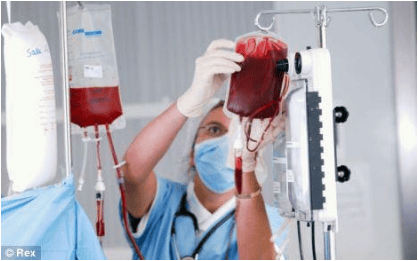
3. Problems related to large volume blood transfusion
Massive blood transfusion helps to restore blood loss that saves lives, but also causes many other disadvantages when large blood transfusions are carried out.3.1 Choosing blood This is a very important step
Choosing the right blood group for ABO and Rh blood group systems. For example: Patients with blood group O+ should receive a transfusion of erythrocytes with O+ group. It is best to choose a new bag of blood within 12-24 hours of donation or to store blood for no more than 5 days. In addition to the transfusion of erythrocytes, the patient needs to receive fresh frozen plasma (supplemented with clotting factors), platelet transfusions to replenish the platelets in the body lost due to heavy bleeding. 3.2 Possible risks in large volume blood transfusion Metabolic disorders Hyperkalemia: Commonly seen in patients with acute / chronic renal failure, children are two subjects that are very susceptible to hyperkalemia due to massive blood transfusions. big. Hyperkalemia can lead to arrhythmias, cardiac arrest, which must be treated with dialysis (dialysis). Citrate poisoning (anticoagulant in blood storage): Manifested by numbness of lips, cramps of limbs, convulsions, arrhythmia, heavier bleeding. Lower blood calcium. Hypothermia Body temperature can be lowered below 36°C because blood bags must be stored cold, when infusion rapidly, much can lower body temperature causing disadvantages caused by hypothermia such as: cold tremor, convulsions, coagulation dysfunction...
Hemostasis disorder Thrombocytopenia Blood clotting disorder Disseminated intravascular coagulation: A serious complication of massive blood transfusion due to blood loss too much, long-term blood loss shock, and a large volume of blood transfusion
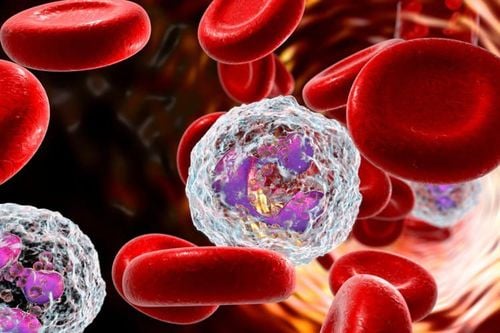
4. Perform large volume blood transfusion
Anesthesiologist, surgeon, hematologist and blood bank must discuss to answer the following questions:Whether a large volume of blood transfusion is needed due to: Number of blood loss, multiple trauma, ice postpartum hemorrhage...., how much blood loss, existing risks. Measures to stop bleeding: Emergency surgery to stop bleeding in multiple trauma, emergency surgery for ruptured abdominal aortic aneurysm.... Number of blood products to be transfused, rate of infusion, possible risks out. Select blood for transfusion: Ensure optimal match of ABO and Rh blood groups, perform compatibility tests on each blood unit. Therefore, minimizing possible complications will help improve the quality of treatment for patients when experiencing events requiring large volume blood transfusion in the emergency.
Please dial HOTLINE for more information or register for an appointment HERE. Download MyVinmec app to make appointments faster and to manage your bookings easily.





